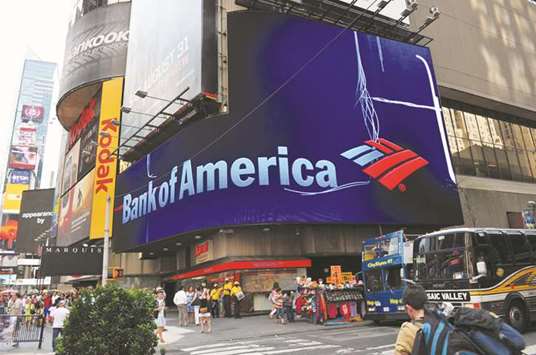Latin America is on pace for the biggest year in equity offerings since 2013, and Bank of America Corp is making the most of it.
Volume credited to the bank was $1.62bn through August 14, almost three times as much as last year in the same period and more than any of its competitors, data compiled by Bloomberg show.
“Brazil is gradually returning to normal after hitting a very low point, and Argentina is very promising, with numerous offerings,” Hans Lin, Bank of America’s head of investment banking for Brazil, said in an interview. “Latin America is benefiting from the flow of funds into emerging markets searching for returns.”
Private equity firms are taking the opportunity to cash out of long-held investments, and many companies are raising cash to pay down debt after struggling through an economic slowdown in Latin America that included the worst recession in Brazil’s history. Companies in the region issued a total of $13bn in equity this year, more than 2016’s full-year total of $9.7bn, which was the lowest since Bloomberg started compiling the data in 2006.
“I am feeling a lot of short-term pressure from private equity funds anxious to leave their investments after years without a way out through the capital markets,” said Joaquim Oliveira, a founding partner at the Souza Cescon Barrieu & Flesch Advogados law firm in Sao Paulo. “They’re trying to do their deals as soon as possible to avoid next year’s presidential election volatility.”
Brazilian companies backed by private equity firms with plans for initial public offerings include food producer Camil Alimentos and information-technology firm Tivit Terceirizacao de Processos Servicos e Tecnologia.
Bank of America, based in Charlotte, North Carolina, was among underwriters on this year’s biggest deal in Latin America: Carrefour’s IPO for the French retailer’s Brazil unit, Atacadao, which raised 5.1bn reais ($1.6bn). Banco Itau BBA was the lead coordinator.
In another sign the country’s three-year IPO logjam had finally broken, airline Azul raised $643.2mn in April after delaying the deal at least three times since 2013.
“This year will be the best in six years for Brazil, no doubt about it, and the first half of 2018 will be positive as well,” said Rodrigo Magalhaes, Itau’s global head of equity. He said falling interest rates in the nation will prompt more pension funds to buy shares.
Banco Santander tops the rankings based on number of deals, at 16. It’s in second place by volume, compared with ninth in 2014.
“It doesn’t matter if we’re No 1 or 2,” said Sergio Rial, Santander’s chief executive officer for the Brazil unit. “What matters is that we advanced a lot over the years.” Rial said the company has gotten better at integrating teams, and was “open for business” throughout the economic crisis.
Brazil represented 63% of the region’s total volume this year, up from 49% in the same period in 2016. Deals out of Argentina and Mexico more than tripled to $1.5bn and $2.8bn, respectively.
At least 15bn reais in deals are still in the pipeline for Brazil this year, bankers said. That would bring the total to around 41bn reais, the most since 2010.
“IPOs are performing very well in Brazil, which demonstrates there is quality demand,” said Glenn Mallett, head of equity capital markets for Banco Bradesco BBI.
This year might have been even more of a boon for underwriters, but another bout of political turmoil in May threatened to derail Brazil’s economic recovery with allegations of corruption ensnaring President Michel Temer. Lin at BofA said it could have been better if “a meaningful social security reform had been approved.”
The market turned out to be more resilient than some bankers expected. “We were positively surprised in Brazil by being able to place six deals after May’s market volatility, including four very important IPOs,” said Roderick Greenlees, Itau’s head of investment banking.
Greenlees said Argentina has been one of the highlights this year, because it’s a comeback story. “There was very little there before,” Greenlees said, estimating that a record 10 equity transactions will come to market during 2017.
President Mauricio Macri’s decision to lift capital controls and resolve a 15-year-old default is helping Argentina join global capital markets after more than a decade of isolation.
Mexico had the second-biggest IPO for the region, with $904mn raised in February by tequila producer Jose Cuervo. The company tried doing the deal in November and postponed it after Donald Trump’s presidential victory.
Chile produced four deals raising $476.3mn, more than the $457.9mn in two transactions during the same period last year. In Peru, a single equity offering came to market this year, raising $51.9mn, compared with none last year.
“A rebound in commodities has helped the region, interest rates are low or even negative abroad,” said Matias Repetto, CEO of BTG Pactual Chile Corredores de Bolsa. “We’re seeing strong inflows into the region, the strongest by far since 2009, because we are coming from a very low and depressed comparison base. But Latin America’s allocation in global portfolios is still far from where it was a few years ago.”
Among downside risks for the region’s markets is the war of words between Trump and North Korean leader Kim Jong-un. “Geopolitical risk is a concern, and the world is more divided now than it has been over the past 50 years, more nervous,” Santander’s Rial said.

A Bank of America branch is seen in New York’s Times Square. Latin America is on pace for the biggest year in equity offerings since 2013, and BoFA is making the most of it.
